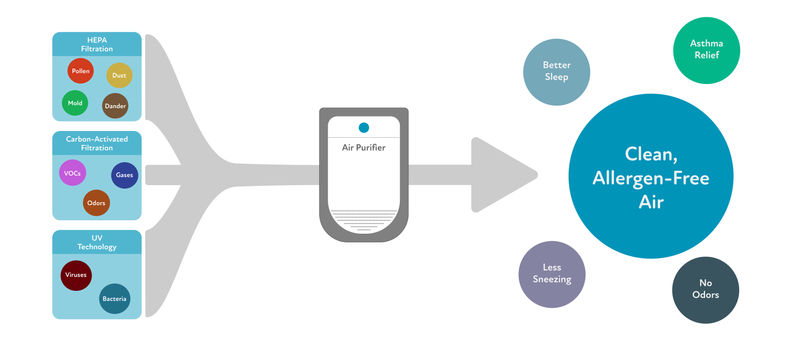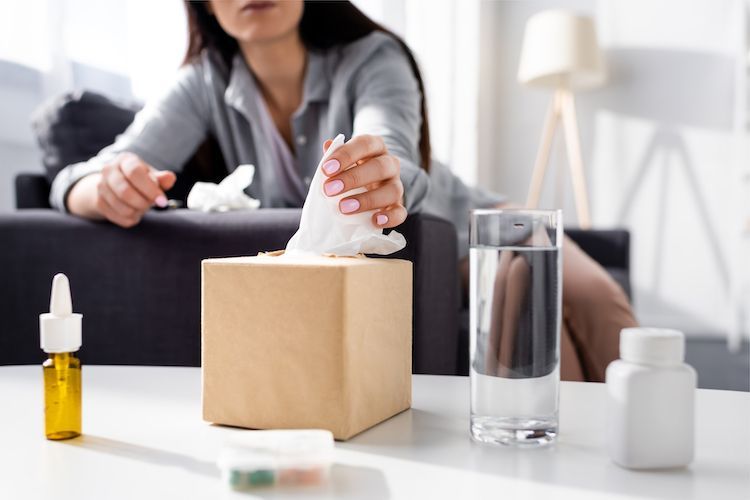Air Purifiers for Allergies
Posted on Saturday, April 10, 2021
To keep this site free for consumers, we receive compensation for customer referrals.
Air Purifiers Help Reduce the Effects of Allergies
Allergies can be unbearable. Scratchy throats, itchy eyes, and a continually dripping nose can ruin your day. Fortunately, consumers have options, like air purifiers, to help control their symptoms. Air purifiers can be an ideal solution for many allergy sufferers, protecting them from various allergens and easing adverse effects. These devices can prevent many types of allergies, have lasting symptom relief, and are often superior to the filters that you find in HVAC systems.

What kinds of allergens can purifiers filter out?
An air purifier for allergies can change your life. Instead of waking up sneezing and sniffling, you can start your day refreshed and content. Some of the primary allergens that air purifiers can filter out include:
- Dust: Often, air purifiers for dust allergies do an outstanding job of catching dust and removing it from the air in your home. They use a process called mechanical filtration, which incorporates filters to trap large dust particles and keep them out of your sinuses.
- Pollen:
You can use an air purifier for pollen removal, as well. Pollen is one of the most common airborne allergens and can infiltrate your indoor air. A high-quality device traps this substance, ensuring it’s out of the air you breathe.
- Dander: Besides serving as an air filter for allergies, purifiers take it a step further. Your dog or cat may give off not-so-pleasant smells, which purifiers help to control. Pet dander can be a double-edged sword, too. Not only can it cause severe allergies, but it also triggers asthmatic reactions in many people who come into contact with it.
The three most common filters used in an air filter, HEPA, Carbon-Activated, and UV technology, work together to remove different types of particulates in the air. While HEPA filtration removes contaminants like dust, pollen, dander, and mold, it isn't designed to remove things like chemicals, gases, and odors from the air. Instead, a carbon-activated filter can be incorporated into a household air purifier to remove these types of air pollutants, specifically helping rid the air of Volatile Organic Compounds (VOCs) and gases like paint fumes and cigarette smoke. Lastly, UV technology deconstructs viruses and bacteria as they pass through the air purifier, which can help stop the spread of germs during flu season.
Most household air purifiers will use a combination of these different types of filtration systems to remove a variety of common home pollutants, bringing you fresh, breathable, odor-free air.

How can an air purifier improve allergy symptoms?
If you’ve been in a room with an air purifier, you can almost taste the clean air circulating the space. It feels and smells fresher, and that’s not an illusion. Air purifiers remove harmful contaminants that directly lead to your discomfort.
One common complaint among allergy sufferers is their lack of sleep during an allergy episode. They wake up in the middle of the night sneezing or feeling scratchy on the roof of their mouths and find it hard to get back to sleep. By removing triggers from the air, air purifiers help many people sleep more soundly through the night.
Even during waking hours, many people don’t realize how strong their allergies are. Utilizing an air purifier can cut down on the general irritation and itchiness that go along with allergy attacks, leading to a much more pleasant day around the house.
A constant sniffle or runny nose can destroy your mood. You’re busy, and while you are taking care of business around the house, the last thing you want to worry about is where the Kleenex box is. Air purifiers can help you spend less time thinking about allergies and more time being productive.
What’s wrong with using an A/C air filter instead?
Many HVAC systems include built-in air filters. These filters do a fine job removing larger particulates. However, for allergies, you will want a much more advanced and effective air filtration device. That’s where air purifiers come in. Many particles that cause allergic reactions are tiny and work right through A/C filters, leaving you sneezing, scratching your eyes, and coughing.
Air purifiers deliver much cleaner air, from the number of particulates they collect to the many varieties of allergens they grab. They also filter out unpleasant scents and nasty odors, creating a clean and fresh air environment in your home. If you are in the market for an air purifier for allergies and asthma, you will do much better with a standalone air purifier instead of counting on the filters included with A/C systems.
Set up a line of defense in your home
Allergies can attack any time of year. If your home is not protected and your home’s air is unpurified, you may suffer for long stretches at a time. An air purifier can clean your air, filtering out harmful and irritating allergens so that you can enjoy breathing freely at home.
The next time you go digging in the medicine cabinet – again – for allergy pills, consider an air purifier. It may be the solution to your allergies that you need. And to narrow down your search, check out our top 10 air purifiers for allergies.

Top Posts
- Exploring Computer Monitors
- Exploring the Benefits of Video Doorbells
- Maintenance for Smoke Detectors
- Treadmills: The Ultimate Guide to Getting Fit
- Rice Cookers for Every Kitchen
- Curling Irons for All Hair Types
- Better Dental Health with Electric Toothbrushes
- Meal Delivery for Celiac Disease & Gluten Intolerance
- Pet Insurance for Cats
- Air Purifiers for Allergies


